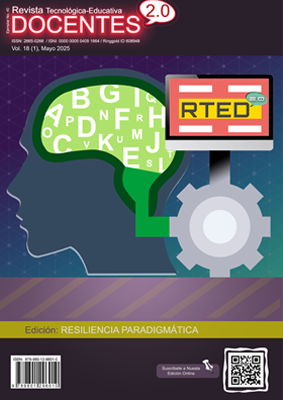The Impact of Mathematical Thinking on Social Dynamics in 5th Grade Students through the Development of Problem Solving
 DOI:
https://doi.org/10.37843/rted.v18i1.544
DOI:
https://doi.org/10.37843/rted.v18i1.544
Main Article Content
Abstract
The ability to solve mathematical problems efficiently is essential for mastering this area of ??knowledge. In addition, it is considered a transversal skill that influences cognitive development and decision-making in various areas of life. The study's objective was to evaluate the impact of a pedagogical strategy based on strengthening problem-solving skills on the development of mathematical thinking in 5th-grade students in Magangué, Colombia. The research was based on the inductive-deductive method, pragmatic paradigm, mixed approach, sequential design, nested concurrent dominant model, and longitudinal section. The sample consists of 210 students, divided into control and experimental groups, with 105 students in each group. Consequently, diagnostic instruments were designed to evaluate the development of mathematical thinking and problem-solving skills before and after implementing the pedagogical strategy. In this order of ideas, it was determined that the results obtained provided empirical evidence on the effectiveness of the pedagogical strategy in developing mathematical thinking in 5th-grade students in Magangué, Colombia. Likewise, it should be noted that this research contributed to the design of effective educational interventions that promote the comprehensive development of students, strengthen their cognitive skills, and improve their academic performance in mathematics.
Downloads
Metrics
Article Details

This work is licensed under a Creative Commons Attribution-NonCommercial-NoDerivatives 4.0 International License.
Those authors who have publications in our journal accept the following terms:
- When a work is accepted for publication, the author retains rights of reproduction, distribution of his/her article for exploitation in all countries of the world in the format provided by our magazine and any other magnetic medium, optical, and digital.
- Authors will retain their copyright and guarantee the journal the right first to publish their work, which will be simultaneously subject to the Creative Commons Acknowledgment License (Attribution-NonCommercial-NoDerivatives 4.0 International (CC BY-NC-ND 4.0)). That allows third parties to copy and redistribute the material in any medium or format, under the following conditions: Acknowledgment - You must properly acknowledge authorship, provide a link to the license, and indicate if any changes have been made. You may do so in any reasonable way, but not in a way that suggests you have the licensor's endorsement or receive it for your use. NonCommercial - You may not use the material for a commercial purpose. NoDerivatives - If you remix, transform, or build from the material, you cannot broadcast the modified material. There are no additional restrictions - You cannot apply legal terms or technological measures that legally restrict you from doing what the license allows.
- Authors may adopt other non-exclusive license agreements to distribute the published version of the work (e.g., deposit it in an institutional archive or publish it in a monographic volume) provided that the initial publication in this journal is indicated.
- Authors are allowed and recommended to disseminate their work through the Internet (e.g., in institutional telematic archives, repositories, libraries, or their website), producing exciting exchanges and increasing the published work's citations.
- Request of withdrawal an article has to be done in writing by the author to the Editor, becoming effective after a written response from the Editor. For this purpose, the author or authors will send correspondence via e-mail: [email protected].
- The author will not receive financial compensation for the publication of his work.
- All Docentes 2.0 Journal publications are under the Open Journal System (OJS) platform at: https://ojs.docentes20.com/.
References
Arias, F. (2006). El proyecto de Investigación. Introducción a la metodología científica. Caracas, Editorial Episteme.
Arias Charry, L. M., Carmona Camargo, L. M., & Rojas España, R. C. (2023). Implementación de una Estrategia Pedagógica Digital para la Resolución de Problemas Matemáticos en Estudiantes de Grado Cuarto de la Institución Educativa Cristóbal Colón de Íquira - Huila. (Tesis de maestría). Universidad de Cartagena.
Bernal, C. (2006). Metodología de la Investigación. Pearson educación
Chasi Guamán, D. T. (2022). Recursos web 3.0 en el aprendizaje de funciones lineales en el noveno año de EGB. (Trabajo de Maestría en Educación, Mención en Enseñanza de la Matemática). Universidad Técnica de Ambato.
Creswell, J. W. (2005). Educational research: Planning, conducting, and evaluating quantitative and qualitative research (2a. ed.). Upper Saddle River, NJ, EE. UU.: Prentice-Hall.
Condori. (2020). Universo, población y muestra.
Estrada, G., & Caravantes, J. (2018). Instrumentos de investigación. Universidad Tecnocientífica del Pacífico S.C.
Garzón, N. O. (2013). Elucubraciones del saber. Universidad Central de Nicaragua UCN.
Gil, I., Blanco, N., Lorenzo, J., & Guerrero, E. (2006). El papel de la afectividad en la resolución de problemas matemáticos. Revista de educación. 340, 551-569. https://n9.cl/2mzjne
López, P., & Fachelli, S. (2015). Metodología de la investigación social cuantitativa. España.
Pachón Parada, J. F. & Riaño Valencia, M. J. (2022). Pensamiento variacional a partir de sucesiones aritméticas que se modelan con ecuaciones de primer y segundo grado por medio de Ecualimat con estudiantes de grado noveno de la IEDR Laguna, Cucunubá – Colombia. (Trabajo de Maestría en Educación en Tecnología). Universidad Distrital Francisco José de Caldas.
Pérez, C. (2018). Uso de lista de cotejo: Como instrumento de observación, una guía para el profesor. Universidad Tecnológica Metropolitana.
Polya, G. (1965). Cómo plantear y resolver problemas (Decimoquinta reimpresión). Editorial Trillas.
Popper, K. (1934). Lógica de la investigación científica. Tecnos.
Ramírez Pérez, P. A. (2021). Diseño de una estrategia pedagógica basada en la metodología de Pólya y orientada a fortalecer la competencia de resolución de problemas matemáticos en estudiantes de sexto grado de postprimaria de la Institución Educativa la Palma, corregimiento la Palma, municipio de Gámbita, Colombia.






